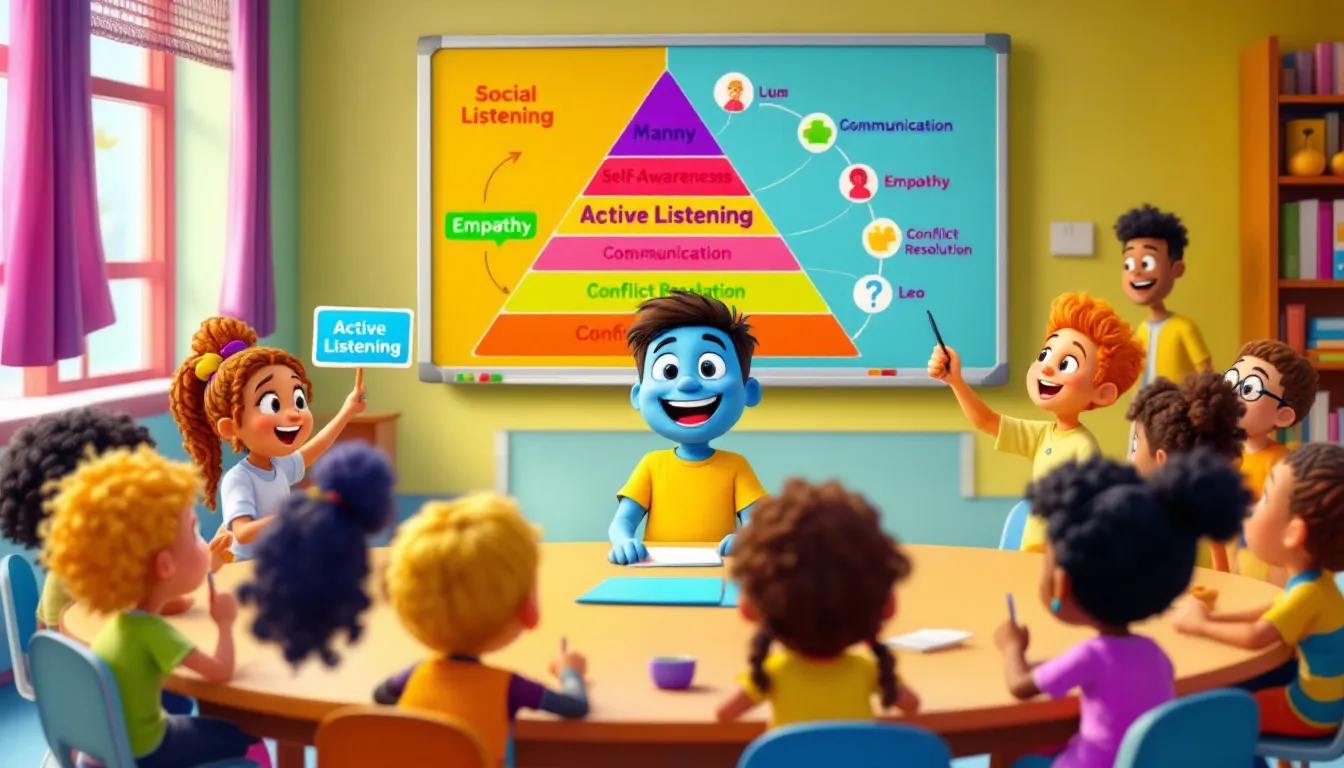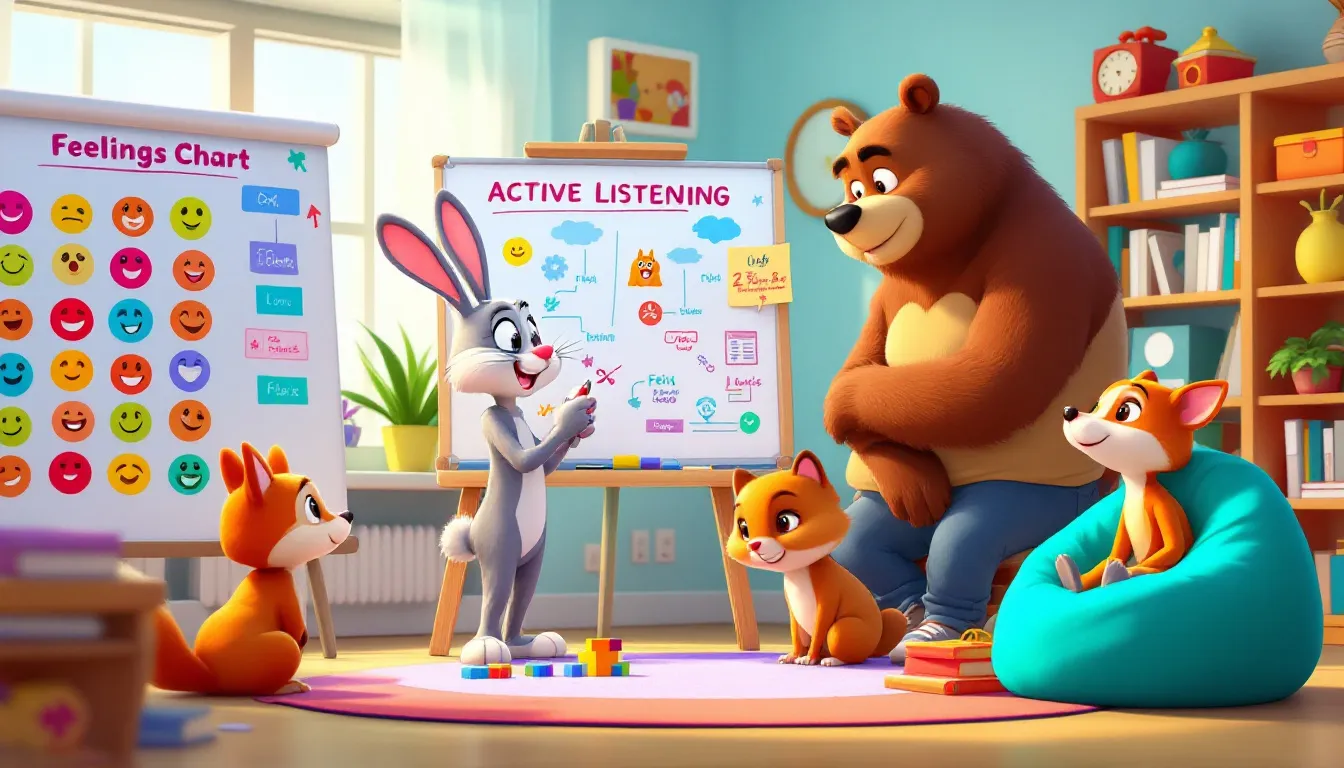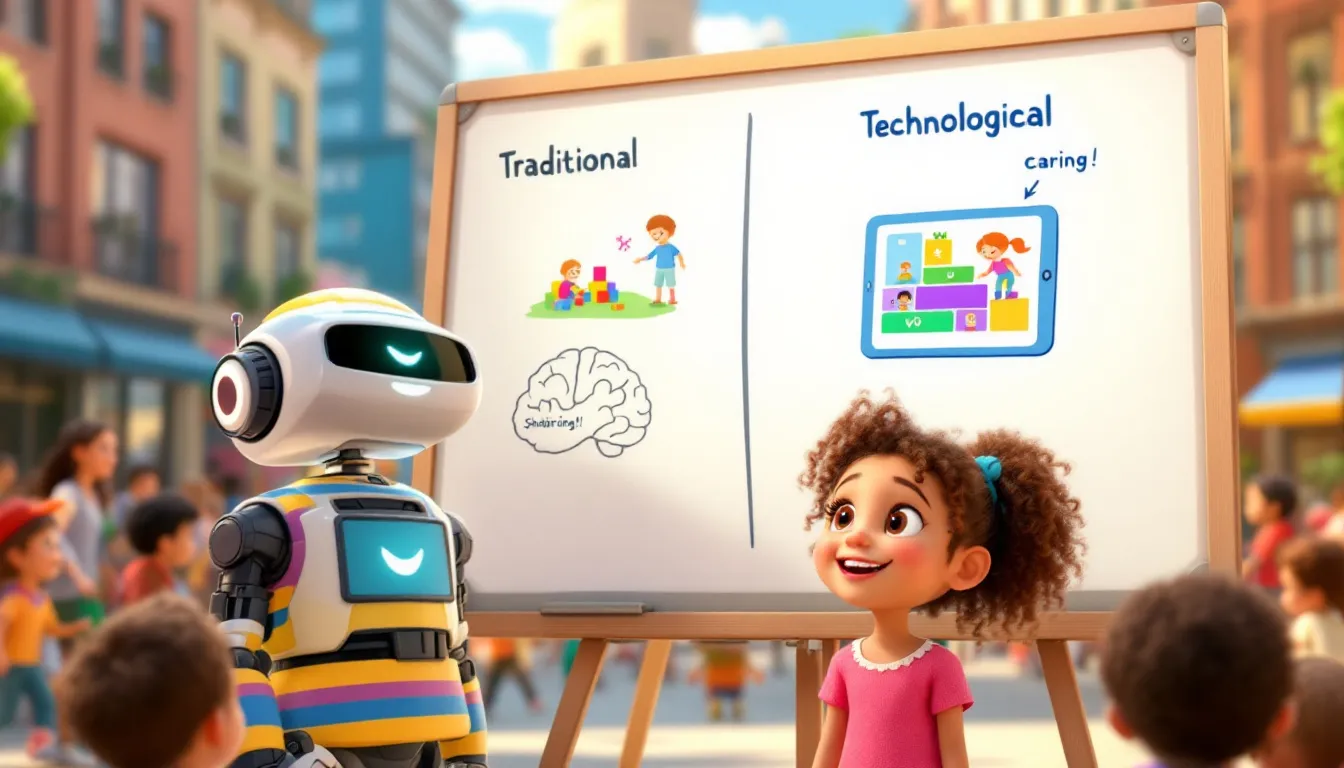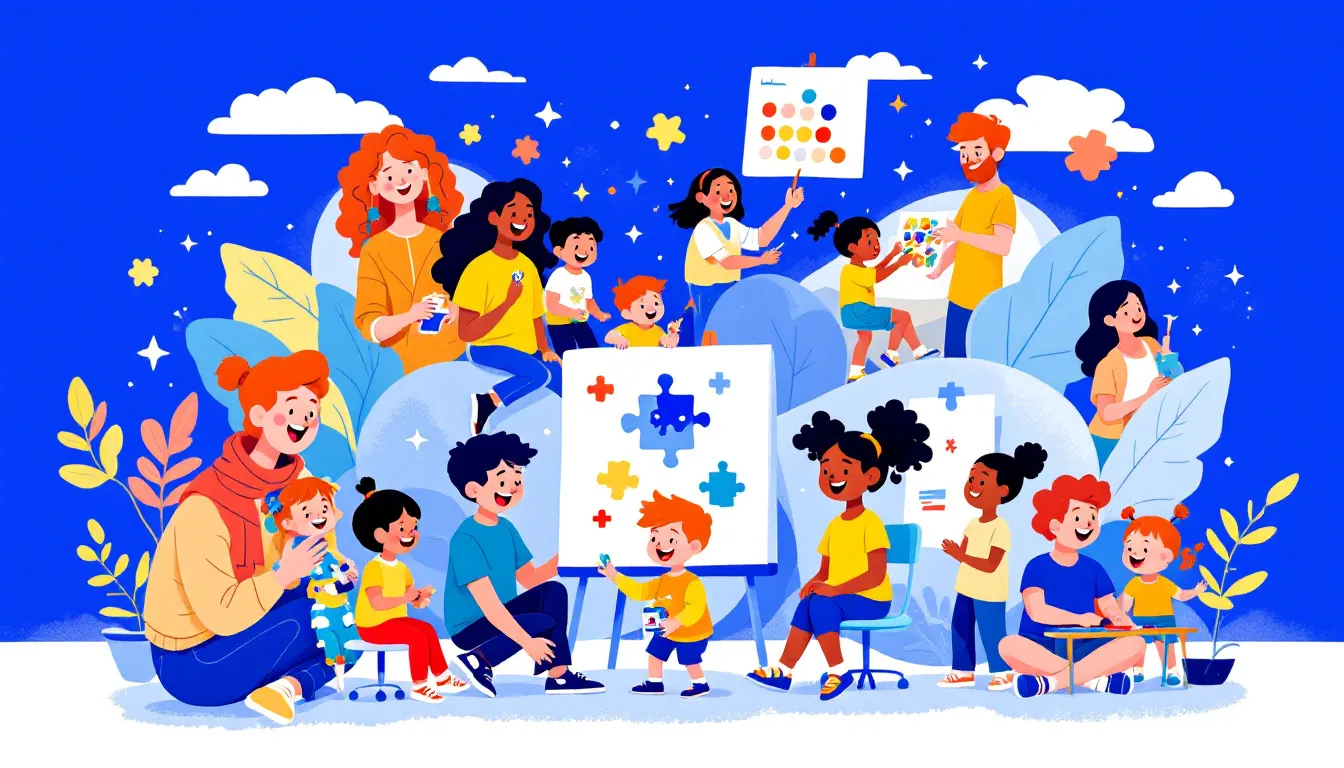Social skills training for autism provides essential strategies to help individuals with autism improve their social interactions and communication. This training is crucial for helping them navigate social situations, form meaningful relationships, and lead fulfilling lives. In this article, we will delve into key methods and techniques used in social skills training to support individuals with autism.
Key Takeaways
- Social skills training (SST) is crucial for enhancing social competence and building meaningful relationships for individuals with autism, addressing their unique communication challenges.
- Effective SST programs incorporate comprehensive assessment, individualized planning, skill development, and practice, with emphasis on generalization and maintenance of skills across various contexts.
- Integration of evidence-based techniques such as role-playing, social stories, and cognitive-behavioral strategies, along with collaboration with parents and caregivers, significantly improves the effectiveness of social skills training for autism.
Understanding Social Skills Training for Autism

Social skills training (SST) is a structured method. It aims to improve social competence in individuals with autism. The primary goal of SST is to improve communication, social interaction, and social behaviors, thereby enabling individuals to navigate social situations more effectively and build meaningful relationships. SST provides individuals with autism the tools and strategies needed for successful social interactions, ultimately leading to a better quality of life.
The significance of effective social skills training cannot be overstated. For individuals on the autism spectrum, mastering social skills is crucial for fostering meaningful relationships and enhancing community participation. Whether it’s through face-to-face interventions or innovative behavioral intervention technologies, SST empowers individuals with autism to lead fulfilling lives and establish connections with others.
Definition and Purpose of Social Skills Training
Social Skills Training (SST) is a structured social skills intervention program designed to teach individuals the skills necessary for social interactions and relationships. This approach is based on evidence. Its goal is to enhance social communication and interaction for individuals with autism while addressing their specific challenges. The primary goal of SST is to develop skills that support interactions with others, enabling meaningful relationships and fostering overall social competence.
SST programs are tailored to meet the specific needs of each individual, focusing on enhancing both verbal and non-verbal communication skills, emotional recognition, language skills, and interaction techniques. These skills are essential not only for personal relationships but also for educational and employment success, as well as daily interactions within the community.
Teaching appropriate social behaviors and communication skills through SST enables individuals with autism to achieve their potential and reach meaningful goals.
Core Social Skills Challenges in Autism
Individuals with autism spectrum disorder (ASD) often encounter significant challenges in social interactions. These challenges include difficulty navigating social situations and understanding social cues. For many on the autism spectrum, interpreting body language, facial expressions, and other nonverbal communication cues can be particularly difficult. Such difficulties can lead to misunderstandings and social isolation, further exacerbating the struggle to build and maintain relationships.
One of the most profound challenges is the “double empathy problem,” which highlights the mutual misunderstandings that often occur between autistic individuals and their non-autistic peers. This problem underscores the need for targeted social skills interventions that address these unique communication barriers. Additionally, many children with autism experience communication challenges such as limited vocal language and difficulty comprehending social language, which can hinder their social participation.
Differences in communication expectations between autistic and non-autistic individuals can create significant barriers to mutual understanding and effective social interaction. Addressing these core social skills challenges through tailored social skills training programs is essential for helping individuals with autism navigate social interactions more successfully and fostering a more inclusive environment.
Key Components of Effective Social Skills Training Programs

Effective social skills training programs are built on several key components that ensure individuals with autism receive the support they need to develop and practice essential social skills. These components include comprehensive assessment and individualized planning, targeted skill development and practice, and the generalization and maintenance of learned skills. Each component plays a crucial role in addressing the unique social skills challenges faced by individuals with autism.
Different training settings, such as one-on-one sessions, group settings, and community-based programs, can be tailored to meet the specific needs of each individual. Community-based programs, including social skills camps and clubs, offer opportunities for individuals to practice social skills in real-world settings, further enhancing their social competence.
Considering the suitability of different formats to the individual’s learning style and social goals enables these programs to effectively teach and reinforce appropriate social behaviors.
Comprehensive Assessment and Individualized Planning
Conducting a thorough assessment of social skills is the first and most critical step in social skills training for individuals with autism. This comprehensive assessment helps identify the specific challenges faced by the individual and provides a foundation for developing an effective intervention plan. The assessment process involves direct observation, interviews, and standardized assessments, ensuring a detailed understanding of the individual’s social skills deficits.
Collaboration between parents and professionals is essential for the success of social skills training. Parents should participate in the planning process by sharing observations about their child’s strengths and challenges, while professionals provide guidance and expertise to develop tailored intervention plans. Regular communication and sharing of progress ensure consistency in social skills training across different settings.
Individualized intervention plans take into account the individual’s strengths, preferences, and specific goals, considering factors such as age, developmental level, and personal aspirations. These plans outline specific social skills, strategies, techniques, and expected outcomes, providing a structured approach to social skills development. Incorporating comprehensive assessment and individualized planning allows social skills training programs to effectively target social skills deficits and promote meaningful progress.
Skill Development and Practice
The skill development and practice phase of social skills training involves teaching specific social skills and strategies through structured instruction. Direct instruction and realistic practice opportunities are crucial for effective social skills training. Family involvement significantly enhances the effectiveness of social skills training, as parents can create opportunities for practice by integrating social skills into daily routines.
Improving nonverbal communication skills is a primary focus during this phase, as many individuals with autism struggle to interpret cues like facial expressions and body language. Teaching emotional regulation and understanding helps individuals with autism better navigate challenging social situations and manage their own emotions.
Training programs often emphasize skills necessary for sharing, cooperation, and conflict resolution, which are vital for maintaining friendships. Combining technology with traditional methods can provide a comprehensive approach to social skills interventions, addressing diverse learning styles and enhancing relational skills.
Focusing on skill development and practice allows social skills training programs to effectively teach and reinforce appropriate social behaviors, leading to improved social skill competence and confidence.
Generalization and Maintenance of Skills
Generalization and maintenance of skills are critical components of effective social skills training programs. The ability to use newly acquired social skills in different settings with various individuals is essential for long-term success. Continuous practice in various contexts helps maintain and generalize social skills, ensuring that individuals can adapt to different social environments.
Structured interactions with peers can help children apply their social skills in diverse contexts, further enhancing their social competence. Parents play a crucial role in encouraging their children to practice social skills in different environments, such as community outings or social events, to help them adapt to various social settings.
Focusing on the generalization and maintenance of skills ensures that learned abilities are retained and effectively applied in real-life situations.
Evidence-Based Techniques in Social Skills Training

Evidence-based techniques are essential for the success of social skills training programs, as they provide methods that have been proven to improve social interactions and communication. These techniques are tailored to meet the unique needs of individuals with autism, addressing specific social skills challenges and enhancing overall social competence. Common techniques employed in social skills training include Social Stories and Scripts, Role-Playing and Modeling, and Visual Supports and Cue Cards.
The primary goal of these evidence-based techniques is to improve social skills and enhance social interactions, ultimately leading to better outcomes for individuals on the autism spectrum. Ongoing research plays a crucial role in advancing social skills training interventions, developing innovative strategies, and identifying the most effective components and techniques.
Employing evidence-based techniques allows social skills training programs to provide targeted interventions that address the unique needs of individuals with autism.
Modeling and Role-Playing
Modeling and role-playing are key techniques utilized in social skills training for autism. The purpose of modeling is to observe and imitate appropriate social behaviors, helping individuals with autism learn effective interaction techniques. Through role-playing, individuals can practice these skills in a safe environment, receiving feedback and guidance from a therapist to refine their social behaviors.
Role-playing benefits individuals with autism by simulating social scenarios, allowing them to practice behaviors and receive feedback in real-time. This method helps build confidence and competence in social interactions. Feedback and guidance from a therapist during role-playing sessions are crucial for refining social skills and ensuring that individuals are prepared for real-life social situations.
Imitation is a key skill that aids individuals in learning communication and social behaviors. Observing a therapist or peer demonstrate behaviors helps individuals with autism learn and apply appropriate social behaviors in various settings. Modeling and role-playing are effective methods for teaching social skills, providing realistic practice opportunities and reinforcing learned skills.
Social Stories and Visual Supports
Social stories and visual supports are valuable tools in social skills training for individuals with autism. Social narratives provide detailed descriptions of social situations, highlighting relevant cues and appropriate responses, which can significantly improve the ability of individuals with autism to navigate social interactions effectively. These tools are designed to enhance understanding and communication for individuals with autism in specific social situations, providing a structured and safe environment for learning.
Visual supports, such as visual schedules and prompts, help individuals with autism understand and predict social interactions, reducing anxiety and improving social competence. Utilizing social stories and visual supports enables social skills training programs to provide targeted interventions that teach appropriate social behaviors and enhance social communication skills.
These tools are particularly effective in helping individuals with autism understand social norms and expectations, facilitating smoother social interactions.
Cognitive-Behavioral Strategies
Cognitive-behavioral strategies are highly effective in social skills training, as they focus on modifying thought processes and enhancing self-awareness and problem-solving abilities. Techniques such as cognitive restructuring, social problem-solving training, and self-monitoring are commonly used to improve social skills. These strategies aim to change negative thought patterns and foster positive social behaviors, helping individuals with autism navigate social interactions more effectively.
Incorporating cognitive-behavioral strategies into social skills training programs helps individuals with autism develop better self-regulation and emotional control. These techniques enable individuals to recognize and challenge negative thoughts, develop positive social behaviors, and improve their overall social competence.
Cognitive-behavioral strategies are an essential component of evidence-based social skills interventions, providing targeted interventions that address specific social skills challenges.
Traditional vs. Technological Approaches in Social Skills Training

Social skills training for autism combines both conventional methods and innovative technological approaches to cater to varying needs. Traditional face-to-face social skills training provides naturalistic interactions, enhancing the development of social skills in authentic contexts. On the other hand, behavioral intervention technologies (BITs) offer new ways to deliver social skills training, adapting to different learning styles and providing flexibility.
Future research should emphasize comparing traditional and technological methods to identify optimal practices. By understanding the benefits and challenges of each approach, social skills training programs can be tailored to meet the diverse needs of individuals with autism, ensuring the most effective interventions are used.
Face-to-Face Social Skills Training
Face-to-face social skills training (F2F-SST) includes organized group sessions. In these sessions, individuals learn and practice social skills alongside peers and a clinician. This method has been shown to improve social competence, enhance friendship quality, and reduce loneliness among children with autism. The effect size of F2F-SST interventions falls within the medium range. This suggests there are moderate improvements in social skills.
F2F-SST provides naturalistic interactions and direct feedback, which are crucial for learning nuanced social cues and practices. This method allows individuals to practice social skills in real-life settings, enhancing their social competence and confidence.
Participation in these structured group sessions helps individuals with autism develop meaningful relationships and improve their overall quality of life.
Behavioral Intervention Technologies
Behavioral intervention technologies (BITs) refer to computer programs, avatars, and therapeutic robots designed for social skills training. These innovative approaches teach social skills such as facial recognition and eye gaze through interactive methods, making social skills training more engaging and accessible. BITs can improve access to social skills training by offering treatment at convenient times, reducing the need for in-person clinicians, and providing flexibility.
Despite the advantages of BITs, current research faces limitations, including limited studies and smaller sample sizes compared to face-to-face social skills training. Families should explore options that best suit their needs and preferences when choosing between BITs and traditional social skills training.
Integrating BITs with traditional methods allows social skills training programs to provide a comprehensive approach that addresses diverse learning styles and needs.
The Role of Parents and Caregivers in Social Skills Development

Parents and caregivers are essential in supporting social skills development for individuals with autism. They play a vital role in this process. Collaborating with professionals helps parents and caregivers reinforce social skills training at home, leading to more effective outcomes.
Creating a supportive environment where learned social skills are consistently practiced and reinforced significantly enhances a child’s social competence and community participation.
Collaboration with Professionals
Collaboration between parents and professionals is essential for the success of social skills training. Parents must engage in ongoing interactions with professionals to effectively implement and adapt social skills training strategies. Coaching from therapists helps parents learn how to foster complex interactions in their children, ensuring consistency and effectiveness in social skills development.
Working closely with occupational therapists, trained professionals, and social workers provides parents with valuable insights and support in reinforcing social skills training at home. This collaborative approach ensures that social skills training is tailored to the individual’s needs and is consistently reinforced across different settings.
Reinforcement and Support at Home
Reinforcement and support at home are crucial for maintaining and generalizing social skills learned during training. Parents can provide ongoing practice and reinforcement over time, ensuring that social skills are retained and effectively applied in real-life settings. Practicing skills in natural settings, such as community outings, improves social skills. It also helps with generalization during social events.
Reinforcing social skills at home requires consistency. It is essential for effective learning. Strategies to help individuals retain and continue using social skills over time should be implemented, providing a safe and structured environment for practice. Reinforcing social skills at home significantly improves a child’s social competence and confidence.
Facilitating Skill Generalization
Facilitating the generalization of learned skills across different situations and contexts is essential for the long-term success of social skills training. Parents can introduce new social situations, provide support and feedback, and encourage skill application in various contexts to help their children adapt to different social environments. Encouraging practice in real-life situations, such as conversations with classmates or community members, helps individuals with autism apply their social skills more effectively.
Facilitating skill generalization ensures that children are prepared to navigate diverse social interactions and environments. This approach helps individuals with autism develop greater social competence and confidence, improving their overall quality of life.
Examples of Social Skills Training Goals and Outcomes
Social skills training programs should be tailored to meet the unique developmental needs of each individual, with goals that vary based on specific challenges and strengths. Common goals include improving communication, emotional understanding, and building friendships. The outcomes of social skills training are typically assessed through parent-report questionnaires, which provide valuable insights into changes in social functioning.
Focusing on these goals and outcomes allows social skills training programs to effectively enhance social interactions and overall quality of life for individuals with autism. These programs provide targeted interventions that address specific social skills challenges, leading to meaningful improvements in social competence and relationships.
Communication and Interaction Goals
Social skills training programs for individuals with autism focus on communication and interaction goals. These goals are central to the effectiveness of the training. The goals focus on promoting the acquisition and performance of social skills. They also aim to enhance existing skills and facilitate generalization across different settings. Positive changes in social skills among children with autism who receive training include improvements in social reciprocity, social participation, social competence, better friendship quality, and reduced loneliness.
For individuals with intellectual disability or developmental delays, social skills training can help improve communication and behavior around peers. These goals often focus on enhancing both verbal and non-verbal communication skills, including initiating conversations and responding appropriately. Targeting these areas helps social skills training programs assist individuals with autism in establishing meaningful connections and improving their overall social competence.
Emotional Understanding and Regulation
Improving emotional understanding and regulation is a key goal in social skills training for individuals with autism. These goals focus on helping individuals recognize and respond to nonverbal cues like facial expressions and body language, which are essential for effective social communication. Developing these skills helps individuals with autism reduce anxiety symptoms, increase confidence, and engage more fully in social interactions.
Social skills training programs also aim to help individuals recognize and challenge negative thoughts, fostering positive social behaviors. This approach encourages mutual understanding and enhances self-esteem, contributing to better social engagement and emotional well-being.
Building and Maintaining Friendships
Building and maintaining friendships are critical goals in social skills training for individuals with autism. These goals emphasize the ability to initiate and sustain meaningful relationships through shared activities and mutual interests. Friendships are essential for enhancing social interaction and emotional well-being, particularly for individuals with autism.
Engaging in shared activities and having mutual interests are foundational elements for developing lasting friendships. Meaningful friendships contribute significantly to the overall social development and emotional stability of individuals with autism, helping them establish meaningful connections and navigate social interactions more effectively.
Future Directions in Social Skills Training for Autism
As we look to the future, the field of social skills training for autism is poised for significant advancements. Twenty-four evidence-based practices have been identified for effectively educating individuals on the autism spectrum, highlighting the need for evolving techniques and improving accessibility.
Future research should focus on comparing the impact of behavioral intervention technologies (BITs) to face-to-face social skills training (F2F-SST) and analyze combinations of both to identify optimal practices.
Utilizing a deployment-focused model and including follow-up assessments helps future studies improve the ecological validity of findings in social skills training. These advancements will ensure that social skills training programs continue to evolve and meet the diverse needs of individuals with autism more effectively.
Enhancing Accessibility and Effectiveness
Enhancing accessibility and effectiveness is a crucial focus for the future of social skills training. Efforts are increasingly directed towards inclusion, ensuring that social skills training meets diverse needs and promotes understanding of neurodiversity. Behavioral intervention technologies (BITs) and various evidence-based techniques offer significant improvements in skill development and accessibility, providing practical solutions for individuals with autism.
Incorporating assessment and targeted interventions enables social skills training programs to achieve significant gains in social competence and overall quality of life for individuals with autism. Continuous research and development in this area will ensure that social skills training remains effective and accessible to all who need it.
Integrating Technology and Traditional Methods
Integrating technology with traditional teaching methods can provide diverse learning opportunities and meet the varying needs of individuals with autism. Face-to-face social skills training allows for direct interaction, which is crucial in teaching nuanced social cues and practices. Behavioral intervention technologies can offer engaging simulations of social situations, enabling practice in a controlled environment.
Combining traditional face-to-face methods with technology can enhance the overall effectiveness of social skills training, making it more interactive and adaptive to individual needs. This integrated approach ensures that individuals with autism receive comprehensive support tailored to their unique learning styles and preferences.
Overcoming Barriers to Access
Overcoming barriers to access is essential for ensuring that all individuals with autism can benefit from social skills training. Common barriers include limited availability of trained professionals, transportation issues, and financial constraints. Financial difficulties can prevent families from affording social skills training programs, impacting their ability to seek necessary support.
Strategies for overcoming these barriers include developing innovative approaches like online platforms and behavioral intervention technologies, which can reduce the need for in-person clinicians and provide flexibility. Additionally, efforts to increase the availability of trained professionals and provide financial assistance can help ensure that social skills training is accessible to all who need it.
Addressing these challenges allows us to create a more inclusive and supportive environment for individuals with autism.
Summary
In summary, social skills training is a crucial component of support for individuals with autism, providing them with the tools and strategies needed to navigate social interactions and build meaningful relationships. By understanding the core challenges, implementing evidence-based techniques, and involving parents and caregivers, social skills training programs can effectively enhance social competence and overall quality of life for individuals with autism.
As we look to the future, continuous research and development in social skills training will ensure that these programs remain effective and accessible. By integrating traditional methods with innovative technologies and addressing barriers to access, we can create a more inclusive and supportive environment for individuals with autism, empowering them to lead fulfilling lives and establish meaningful connections.
Frequently Asked Questions
What is social skills training for autism?
Social skills training (SST) is an effective method aimed at improving communication and social interactions in individuals with autism. This structured approach fosters better social competence and behavior, ultimately enhancing their ability to engage with others.
What are the key components of effective social skills training programs?
Effective social skills training programs consist of comprehensive assessment and individualized planning, focused skill development and practice, and strategies for generalization and maintenance of the learned skills. Each component is essential for ensuring that participants successfully apply their social skills in various contexts.
How do behavioral intervention technologies (BITs) help in social skills training?
Behavioral intervention technologies (BITs) enhance social skills training by providing interactive tools for learning critical skills like facial recognition and eye gaze. This makes the training more engaging and accessible for users.
What role do parents and caregivers play in social skills development?
Parents and caregivers are essential in social skills development, as they reinforce training at home and collaborate with professionals to help children apply learned skills in various settings. Their involvement significantly contributes to a child's social competence.
What are the future directions in social skills training for autism?
Future directions in social skills training for autism focus on enhancing accessibility and effectiveness through the integration of technology with traditional methods, while addressing barriers to ensure diverse needs are met and promoting understanding of neurodiversity.
Original content from the Upbility writing team. Reproduction of this article, in whole or in part, without credit to the publisher is prohibited.









